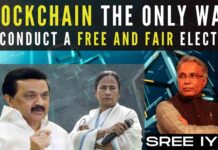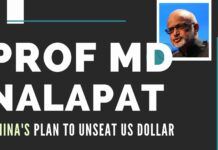Want a government that works without corruption? Want an insurance settlement in less than 24 hours? Want seamless movement of goods from one corner of the country to the other? Distributed Ledger Technology (DLT) can do it. PGurus in conversation with Sopnendu Mohanty, Chief Fintech Officer, Monetary Authority of Singapore.
Some of the applications of DLT
- Over 60% of the expenses incurred in the Insurance industry is due to Claims processing… Imagine if there is a way to clear the claims within 24 hours with no loss (read corruption/ kickbacks).
- Payments can be made through banks for all essential expenses with no overheads for “processing fees”.
- All real estate transactions such as leasing, land, housing done seamlessly, with automatic payments setup for tax payments etc. using Smart Contracts.
Watch the video to find out how DLT is changing people’s lives in a fundamental way.
Transcript of Sree Iyer in conversation with Sopnendu Mohanty
Sree Iyer: Sopnendu Mohanty is Chief Fintech Officer of Monetary Authority of Singapore. I came to know about Sopnendu because I had done a course in MIT on Fintech and Sopnendu had a lot of useful technical videos about the future of Fintech especially involving around block chain, Distributed Ledger System [DLS], Bit coin and so on
Sree Iyer: Where does this journey of yours begin, where are you born?
Sopnendu: I was born in Orissa a small place in Cuttack in Orissa eastern part of India; in and out I am an odiya.
Sree Iyer: Well I have been to the Konark temple and its engineering marvel, and someone told me that the sun god statue, the statue use to float in the air, because they had used magnets cleverly which keep the thing floating. There are only a few deities in India which had that Nataraja of Chidambaram, Somnath temple’s Shiva Linga, it was a marvellous piece just looking at what it is today I can cast my mind back to how great this temple should have been.
Sopnendu: Normally the notion of engineering is the western concept but I think if you go back to Indian history and perhaps many years back or thousands of year back we did create remarkable engineering activity and somehow we don’t tell that story well and somehow it get mixed with religions, mixed with other things but the pure abstracting that human endeavoured to build something great, something new, something engineer, something unthinkable, something that lost in that whole narrative and I think we should find a way to tell again.
Sopnendu: So I was born in Orissa, I studied in some part of Orissa went to Ranchi and Mesra, Birla Institute of Technology and I joined a firm, then I started my career in Citi Bank for 18 years and multiple jobs, spent lot of time in Japan almost 13 years, almost my first job started in Japan, I did jobs in technology, operations, finance, business development, re-engineering, I run the Asia operations for Citi and consumer side and the Retail Branch Distribution Network and then I was Global head of innovation for the retail side of the firm. Then the Singapore government decided to call me and say, hey why don’t you join us and run this unique opportunity of driving financial technology Innovation as part of the biggest strategies Singapore government had as part of the Smart Nation they are building by 2020. That’s kind of brief run away story of Orissa – Ranchi – Delhi – Tokya to Singapore.
Sree Iyer: As part of my course a lot of the topics that you had dealt with had to do with Block Chain the use of Distributor Ledger System (DLS) and what are the different applications that Block Chain can use and one of the things that is really hot right now in India is the Goods Services and Taxes and the backbone of that called GSTN [Goods Services Taxes Network] now the GSTN is still in its design stage, Infosys is doing the design and I have been writing in my website very vociferously I should say, about how DLS should start becoming the fundamental part of this GSTN so that, essentially when GSTN is completely operational you are going to have goods move from Mumbai to Bhubaneshwar with not a single stoppage, just think about that everything happening the distance would may be 1200 Kms or something it should be able to cover that in 20 Hrs it should be able to happen. But today in 6 Hrs you don’t even cross one State. So I have been really pitching for this and in fact I am going to be writing more articles about how this DLS should from part of some of the new emerging technologies in India. The reason I pick GSTN was because it is here today. Aadhaar is already invented and its already in place whatever be the thing I don’t know if that’s going to have any verticals where we can start introducing DLS, but may be you can share with us some of the initiatives that the Government of Singapore is doing and where DLS is getting deployed?
Sopnendu: I think for to take a step back for Singapore to build, Singapore is worlds now third largest financial centre hub, big part of our activity is Global networking in fact whether you are running a FX or you are running bond market or you are running trade finance and all this rely on very centralised activity and which is what we call as the assumption today, what we call the disruption happening against anything centralised is equal to trust but that comes with the remarkable cost and not necessarily the most efficient process. So for Singapore government, we thought Distributed Ledger Technology [DLT] was something meaningful to us, how do we use the technology to distribute mutualised cost and processing across multiple trusted parties and the challenge is how do you trust multiple centres, multiple entities where the conservative thought is that, if it is a Central bank, we trust central bank. Just an example if Central grants payment processing people trusts that’s the settlement engine, that’s settlement process, we all trusts that the Central body.
Now think about if I can use DLT and decentralise this process and everybody who is processing the payment becoming a part of the settlement process it completely mutualise cost and it makes us processing farmers efficient. Now the question is, is trust any more relevant? I think DLT answers the question that trust is no more something we should worry about, because trust is a mood point, because the underlined technology, underlined algorithm, the smart contract, the smart code ensures that there are rules in the system which protects the governance on its own. We don’t have to be on terms of people, cost structure, governance modality to drive the centralise view. To us its huge opportunity to decentralise cost and it is a huge opportunity to optimize different parts of the eco system to do what they are good at rather than try to consolidate and try to govern in a most inefficient way.
We have started to whole sale payment in experiment, we are the only central bank who have done a production grade whole sale payment infrastructure on block chain, we just completed it last month, a report is coming out soon on that and we are now in the mode of doing cross border Fx settlement with central bank, we are looking at three-four major central banker to participate and we are looking at settlement of payment with exchanges and the instruments / securities will be exchanged that’s on payment side. We are also looking at something very basic to connect to people, that’s there in India and most of the parts of the world. We all take life Insurance; the moment we leave planet earth, the process of getting the money to our benefiter is perhaps take a year’s time. So we have started a experiment in Singapore, where you put the contract of life insurance on block chain and smart contract and the moment I die, my benefiter does not have to wait set of processes to kick in, all the accounts are there, my beneficiary details are there, the moment I die, my agency reports, my death and family gets there respectively compensation which comes as a part of insurance. Now imagine 60% of the insurance business is all about claim processing and imagine that that completely eliminates and it brings predictability to all the process and the crimes. Imagine the crimes that happens on insurance policy, imagine all the bollywood movie based on them, how to kill a person who is insured with a lot of money, imagine that brings a tremendous change to the society, how the ledger and the smart contracts actually works in a day to day life and to me this will be huge transformational opportunity and lastly to end that the large part of our Asian emerging markets are still struggling when it comes to distributing the wealth to the bottom of the pyramid, again ledgers technology comes in a big way here, if you can build contracts and obligations smartly on this platform we can take out corruption and middle men out of the picture.
Sree Iyer: Wonderful…. Actually, India has tried doing it without DLT itself, for instance what they do now, senior citizens, when they have these Gas cylinders what we use for cooking, there is a subsidy on Gas Cylinders for senior citizen, you pay at full rate, but the subsidy comes from the govt. directly into the your bank account, previously, what use to be happening was, you had to give it to the guy who exchanges the cylinder and there is some loss, that is obvious as the guy expects some baksheesh and all, now that’s completely eliminated and a lot of senior citizen get it automatically into their bank account, this is just a small step.
Sopnendu: I think the good thing of DLT it removes all the institutions which comes in between, to me that’s the huge league forward, because Aadhaar on its own may not be relevant if you build an distributed infrastructure where your ID is what is sitting on the ledger rather on centralised and in fact lot of this political noise around, Aadhaar being a centralised place of folding and that goes away. All these you can hack in to the data base and everything is gone & it becomes irrelevant. I think Distributed Ledger Technology can completely re-imagine, re-architect this huge notion around about somebody is holding something about you. The narrative changes here, you are the owner of your data and it is trusted system and you don’t need somebody to certify your own value and that’s a huge shift and if you think about it in a analogue world, if you all trust each other, the police doesn’t exist, the central bank doesn’t exist, the parliament doesn’t exist , the Politian doesn’t exist, the entire society is trusting the network of people, who say what they say, believe what they do, commit what they commit and that’s something to be reimagined.
Sree Iyer: That’s something fascinating. Thank you so much for taking time out for meeting with us.
- Indian Parliament’s Special Session is convened to mark the shifting to new Parliament building - September 3, 2023
- Why did Rajat Sharma of India TV not declare that Adani owns more than 16% shares in his channel? - January 29, 2023
- Prannoy Roy to get Rs.605 crore from Adani as per Stock Exchange filing. Why is Income Tax not acting on Roys’ dues of over Rs.800 crore? - January 4, 2023











I have a lot of respect for the articles coming out of PGurus but surprised to see what the interviewer is talking about from 11:25 onwards. LPG subsidy in India is for all below income of Rs. 10 lakhs per year, not senior citizens as the interviewer says.
The mention of LPG subsidy was an example of how banking has reduced corruption. That it allows ppl. whose income is < 10L is good. It does not add to the point being made. Thanks for pointing it out. But look at the big picture.
Again very poorly edited with several mistakes the render several sentences incomprehensible. I am glad to offer my services to be a part time editor. If there is interest please email me.